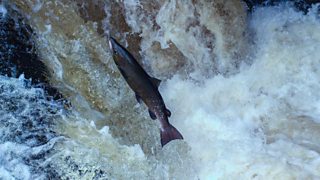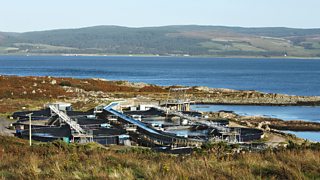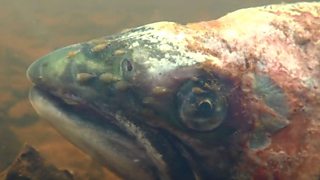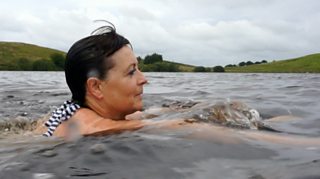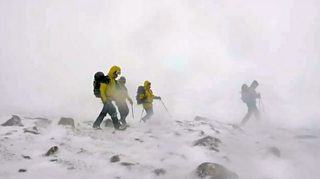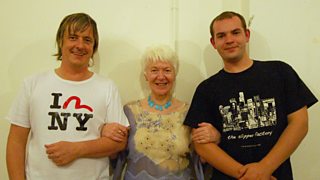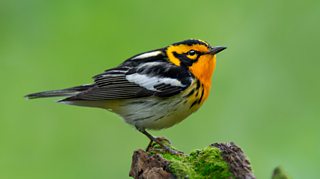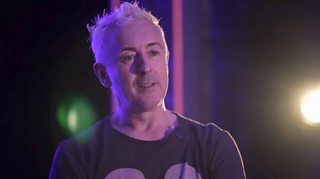Salmon farms: a vital industry for the west coast & northern isles of Scotland or the reason for dwindling numbers of wild fish?
16 October 2018
Salmon farming is a big employer in the west coast and northern isles of Scotland, but is the industry harming the numbers of wild fish in Scottish rivers and having a knock-on economic effect on small towns reliant on fishing tourism?
Landward: Saving Our Salmon met Katrine and Dennis Johnson, who work on a salmon farm, and Raymond Dingwall, a , to find out their opinions.
‘It’s important for the future of the islands’
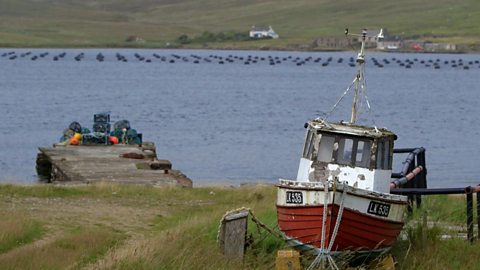
Katrine Johnson explains how salmon farms have provided an economic lifeline for the island of Unst, Shetland
Katrine talks about the importance of salmon farming in Shetland.
The 208 salmon farms on Scotland’s west coast and northern isles employ approximately 8,000 people. Some of the smaller island communities rely heavily on the industry.
The islands of have a salmon farm that employs 100 people: one tenth of the two islands’ entire population. Almost everyone on the island has a relative that works on the farm.
Katrine and Dennis Johnson are a husband and wife team with more family connection to the salmon farm than most.
Sharing a picture of Dennis, his cousin Francis, his Uncle Brian, and his Uncle Magnus – who started the salmon farm on Unst and Yell – Katrine explained just how crucial it was to keep the salmon farm industry on the islands.
“It’s very important for the future of the islands to have sustainable employment here all the time. It’s jobs that go on all-year round. It’s not seasonal work: it’s permanent full-time work.”
‘The declining rod and line sector’
Raymond Dingwall used to work as a ghillie – someone who attends on a fishing expedition – and explained the reason he feels he lost his job.
“In my opinion it’s down to the arrival of aquaculture in the west coast of Scotland. It’s had a massive impact on the greater ecosystem, marine and also wild fish stocks.
“I’ve personally witnessed 400 sea lice on a juvenile seatrout. That is just completely unacceptable: they’ve got no chance of survival. They’re all dying.”
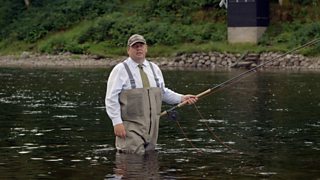
Anywhere there is aquaculture, we all share the same problems.
Raymond also believes declining fish stocks have had a direct impact on the local economy.
“There have been many job losses. The money that was coming in to the area that was being spent on petrol stations, hotels, and pubs is all gone. The wealth from aquaculture goes out of the country. If you look at the social and economic side of rod and line fisheries compared to aquaculture then it doesn’t stack up.”
-
![]()
Landward: Saving Our Salmon
On ����ý iPlayer, an hour-long special in which Landward investigates the plummeting numbers of wild salmon in Scotland’s rivers.
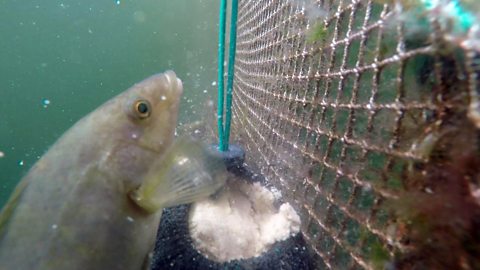
Concerns are being raised that stocks of wild wrasse are being put at risk to protect Scotland’s salmon farms
Wrasse use in salmon farms has increased because they’re effecting at attacking sea lice.
More about fish farms and their impact (both positive & negative)
Latest features from ����ý Scotland
-
![]()
'Wild swimming helps me process the grief of losing my son'
The benefits of cold water therapy.
-
![]()
Winter adventures are appealing, but an expert advises caution
Trips in winter require particular knowledge and skills.
-
![]()
The rescuers: Why volunteers risk their lives in mountain emergencies
Landward meets members of the Cairngorm Mountain Rescue Team.
-
![]()
‘Look for the light’ – practical tips to help you through another winter with SAD
Useful advice and tips to combat low moods at this time of year.
-
![]()
How you could be a binge drinker without even knowing
Binge drinking is classed as fewer units than many people may realise.
-
![]()
How chocolate biscuits and drama classes helped one man leave prison behind
The healing power of creativity.
-
![]()
'When people believe in you, it’s life-changing'
Author Graeme Armstrong revisits the man who helped turn his life around.
-
![]()
The 'breath-taking' display of US birds swept on to British soil
Recent storms have brought rare birds to our shores.
-
![]()
Six things we learned about Alan Cumming on Take the Floor (Spoiler: includes accordions)
The actor spoke to Take the Floor's Gary Innes.
-
![]()
How street gangs trap young men in a dangerous cycle of violence
The almost inescapable pull of life in a gang.
-
![]()
Why stylist Gok Wan believes there's no such thing as bad fashion
The fashion expert says we should stop following rules and do what feels right.
-
![]()
Is sending a CV still the right way to apply for a job?
They've been central to job applications for years, but are they worth it?
